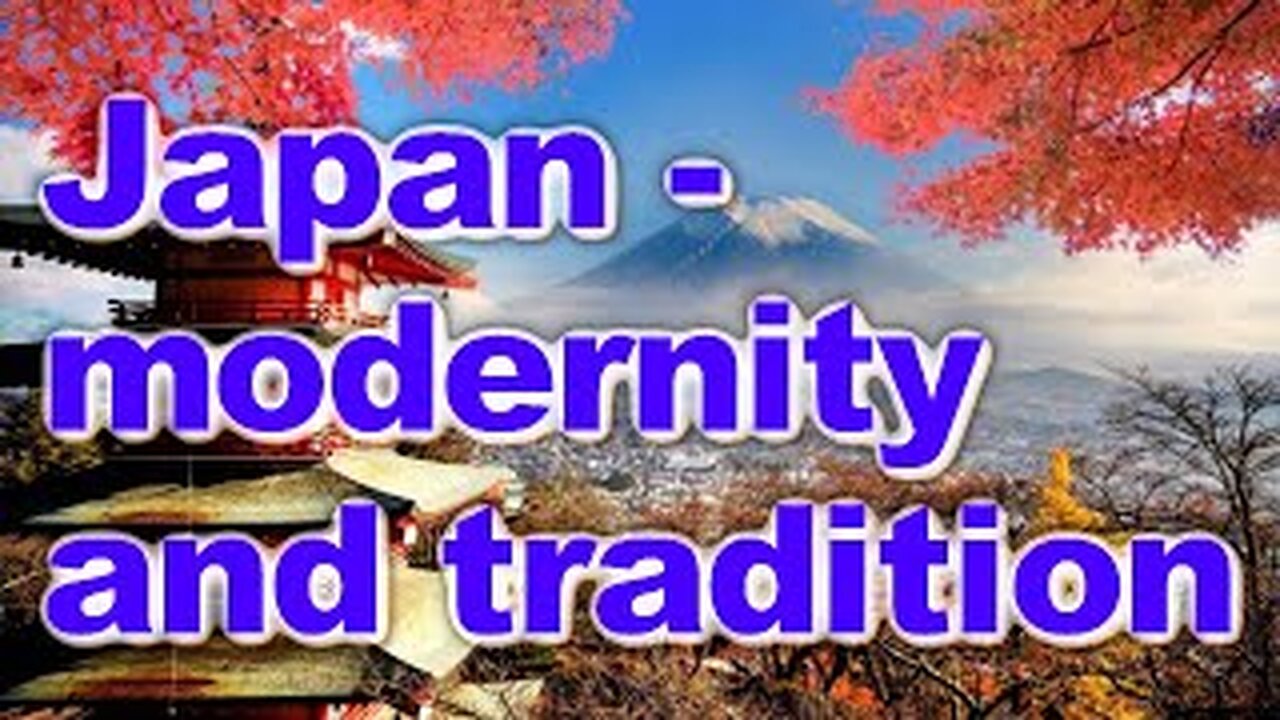Premium Only Content

❤️Japan - modernity and tradition
Japan is a unique country with a rich culture, impressive nature and high-tech cities. This is a place where modernity harmoniously combines with tradition. Let's immerse ourselves in the tourist atmosphere of Japan. Tokyo. The capital of Japan, where you can enjoy the symbiosis of modernity and traditional Japanese culture. Particularly recommended are Akihabara for pop culture buffs and Shinjuku for those who want to see the bright neon signs and feel the pulsating life of the city. Kyoto. The spiritual capital of Japan, with thousands of temples and gardens. There is an atmosphere of old Japan here. You can visit the golden pavilion of Kinkaku-ji and stroll through the Gion district, where, if you are lucky, you can meet a real geisha. Osaka. Known as the gastronomic capital of Japan. Don't miss Osaka Castle and the Dotonbori area with its huge selection of street food. Hokkaido. An island known for its stunning winter scenery, snow festivals and ski resorts. Traditional and popular dishes. Sushi and Sashimi are the most famous Japanese dishes in the world. Ramen is a rich noodle soup that has many regional variations. Takoyaki, fried dough balls filled with octopus, is popular in Osaka. Matcha is a traditional Japanese green tea powder used in food and beverages. Natural phenomena. Sakura. Cherry blossoms are the most famous and anticipated phenomenon in Japan; they create a unique atmosphere and attract tourists from all over the world. Mount Fuji. The symbol of Japan, a volcano that can be seen even from Tokyo in clear weather. Japanese Alps. An ideal place for lovers of hiking and mountain tourism. Hot springs. Thanks to the country's volcanic activity, Japan has plenty of natural hot springs where you can relax. Mystic stories. Aokigahara Forest. Forest at the foot of Mount Fuji. Surrounded by many legends and myths related to ghosts and spirits in Japanese culture. Temples and shrines throughout Japan are often associated with mystical stories and legends. One example is the Fushimi Inari Shrine in Kyoto with its thousands of red torii where spirits reside. Torii is a gate that symbolizes the border between the world of the living and the dead. The Japanese have a belief that birds sit on the crossbar of this gate and, flying away, carry away the souls of dead people. Torii are also considered a symbol of good luck. Isshi-no-yoji. Stories about ghosts and demons (yokai) are widely used in both ancient and modern Japanese works of art. One popular theme is the tale of Yotsuya Kaidan, a story of loyalty and revenge set in the Edo era. Miyajima Island is famous for its torii gates that rise above the water. According to legend, the coastal waters are the abode of spirits, and the gate itself serves as the border between the human world and the divine world. Japan offers an endless number of amazing places to explore, each with a unique history, rich culture and beautiful nature. From breathtaking cityscapes to quiet, secluded spots, there's something for everyone. Traveling through this country will leave vivid impressions in your soul for many years. Japan is replete with mystical legends and beliefs that go back to ancient times. Here are a few of them that are surrounded by a special aura of mystery. The Legend of Yokai. Yokai are a broad category of supernatural creatures that include demons, ghosts, and mythical animals. There are a huge variety of yokai, each with their own history. One of the most mysterious is Kappa, a water demon who, according to legend, lives in the rivers and ponds of Japan and can lure people under water. Ghosts of the Heian period. The Heian era of Japan is replete with ghost stories, one of the most famous being the ghost of Oiwa. According to legend, after her treacherous murder, her soul returns to haunt her husband, driving him to madness and death. This story served as the basis for many classic Japanese works, including the games of Noh and Kabuki. Legend of Tengu. Tengu are mythical creatures native to the mountains and forests of Japan, often depicted with a human body and a long nose or as a bird. They are considered protectors of forests and mountains and can be both grateful and vengeful. It is believed that Tengu have great magical powers, can change their shape and move people over long distances. Stories about Samurai and Ron. There are many legends about samurai and ron (samurai without a master) whose spirits find no peace. One such story is the story of Tomue Gozen. A female samurai from the Gempei War who was renowned for her unparalleled strength and skill in battle. Her spirit is believed to protect certain places in Japan. The Legend of Tsukumogami. Tsukumogami are objects that have reached the age of one hundred years and have acquired a soul of their own. These creatures can display both benevolent and malevolent traits, depending on how they were treated by their owners.
-
 11:33
11:33
DeVory Darkins
18 hours ago $12.36 earnedJustin Trudeau PANICS after Trump slaps Canada with AGGRESSIVE Tariffs
57.3K156 -
 19:11
19:11
Stephen Gardner
1 day ago🔥HOLY CRAP! Chuck Schumer UNDER INVESTIGATION | 3 HUGE Trump MOVES explained!
77.3K203 -
 4:53:35
4:53:35
Rotella Games
8 hours agoGrand Theft America - GTA IV | Day 4
33.3K3 -
 LIVE
LIVE
Scottish Viking Gaming
6 hours ago💚Rumble :|: Sunday Funday :|: Rumble Fam Knows What's Up!!
314 watching -
 LIVE
LIVE
ttvglamourx
5 hours ago $2.12 earnedEGIRL VS TOXIC COD LOBBIES !DISCORD
360 watching -
 3:19:17
3:19:17
LumpyPotatoX2
7 hours agoSCUM: Lumpy Land RP Server - Day #1 - #RumbleGaming
39K2 -
 1:42:59
1:42:59
Game On!
20 hours ago $8.44 earnedTop 10 Super Bowl Bets You Can't Afford To Miss!
76K9 -
 2:17:02
2:17:02
Tundra Tactical
1 day ago $22.52 earnedTundra Nation Live : Shawn Of S2 Armament Joins The Boys
163K28 -
 11:00:11
11:00:11
tacetmort3m
1 day ago🔴 LIVE - SOLO RANK GRINDING CONTINUES - MARVEL RIVALS
210K5 -
![Shadows Of Chroma Tower, Alpha Playtest [Part 1]](https://1a-1791.com/video/fwe2/1d/s8/1/5/Q/U/n/5QUnx.0kob-small-Shadows-Of-Chroma-Tower-Alp.jpg) 13:29:21
13:29:21
iViperKing
1 day agoShadows Of Chroma Tower, Alpha Playtest [Part 1]
172K9